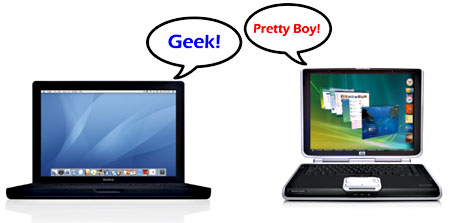Matt Yglesias, a longtime Apple junkie, wants to know why the rest of the computing industry sucks so bad:
It always seemed to me, as an Apple fan, that the qualities Apple put together were pretty basic — gadgets that work well, which a lot of people do, paired with good design sense. And in fields that aren’t computers and electronics, lots of people seem to do this….In computing, not so much. Even at the height of Microsoft’s power in the late-’90s, Windows 98 was oddly ugly. Surely the richest company on the planet could hire someone to design a better logo than this, right? Why were the default color combinations on Excel charts so wretched? Why didn’t anyone else bother to design power adaptors that look good?
On the power adapter thing, I’ve long wondered about that too. This is not exactly rocket science. And I can’t believe that Apple’s version is really that much more expensive than the brick used by everyone else. It’s weird.
But on the broader question, there really is an answer. Make no mistake: Apple under Jobs did a great job. But Steve Jobs chose to keep Apple a niche product, aimed at people who could afford to spend a lot of money for a computer that worked precisely  the way he wanted it to, and did so with a nice design aesthetic. There are plenty of people who like this vision, but “plenty” still means about 10% of the market or so.
the way he wanted it to, and did so with a nice design aesthetic. There are plenty of people who like this vision, but “plenty” still means about 10% of the market or so.
The rest of the personal computing world took a different turn. No one company controlled everything, the PC was a wide-open environment, and it was both cheap and aimed at the business market, where green eyeshade accountants simply didn’t care if the Windows logo was ugly. Yes, the competition over price, features, flexibility, and bringing new applications to market was so frenetic that there was a price to be paid in reliability. But no matter how much you hate it, lots and lots of people decided this was a superior approach. Sure, the parts didn’t work together as well as they did on a Macintosh, but there were a lot more parts available. Sure, the design aesthetic was clunky, but lots of people didn’t care and the cost was often half of a comparable Macintosh. Sure, the Mac did a few things better in the page makeup and illustration fields, but PCs did a lot of things better in the business software field, in both the front office and the back office.
This whole argument reminds me of the great VHS vs. Betamax controversy. Consumers are stupid! screamed the Beta fans when their format died. Beta was clearly a superior format. Well, no, it wasn’t. There’s no single continuum of “quality”: every piece of technology ever invented is a series of compromises. Beta provided better picture quality, but with short runtimes and relatively high cost. VHS made a different set of compromise: adequate picture quality with higher runtimes and lower cost. That set of compromises turned out to be more popular.
Ditto for PCs. By hook or by crook, PCs and Macintoshes simply represent a different set of compromises. If you’re primarily a writer or an artist, aren’t too price sensitive, don’t care about setting up an office network, and value good design, then a Macintosh is a great computer. But don’t kid yourself: you’re accepting a certain set of compromises, not picking an objectively better product. If you’re primarily a financial analyst or a product manager, want lots of choices of computing platform and software, work primarily on a corporate network, don’t want to spend a lot of money, and don’t really care about design aesthetics, then a PC is a better choice for you. This was especially true in the 80s and 90s, when PCs and Macintoshes were initially duking it out for market share. You can laugh at those old Compaq sewing machines all you want, but in 1983 they were revolutionary and it was many years before Apple had anything to compete with it.
A lot of these differences are less pronounced now than they used to be. Although price is still a big difference, Macs are more network friendly and have a broader range of software than they did in the past. Likewise, PCs have a better design sense and work better than they used to. To a large extent, PC market share today is just an artifact of the inertia PCs gained in the 80s and 90s. Still, that inertia happened for a reason, and only part of it was the famous Microsoft marketing juggernaut. The PC market and the Macintosh market evolved as a different set of compromises to address a similar set of problems, and in the end, the PC’s compromises attracted more buyers. Neither one was better or worse. They were just — as Steve Jobs might have said — different.














